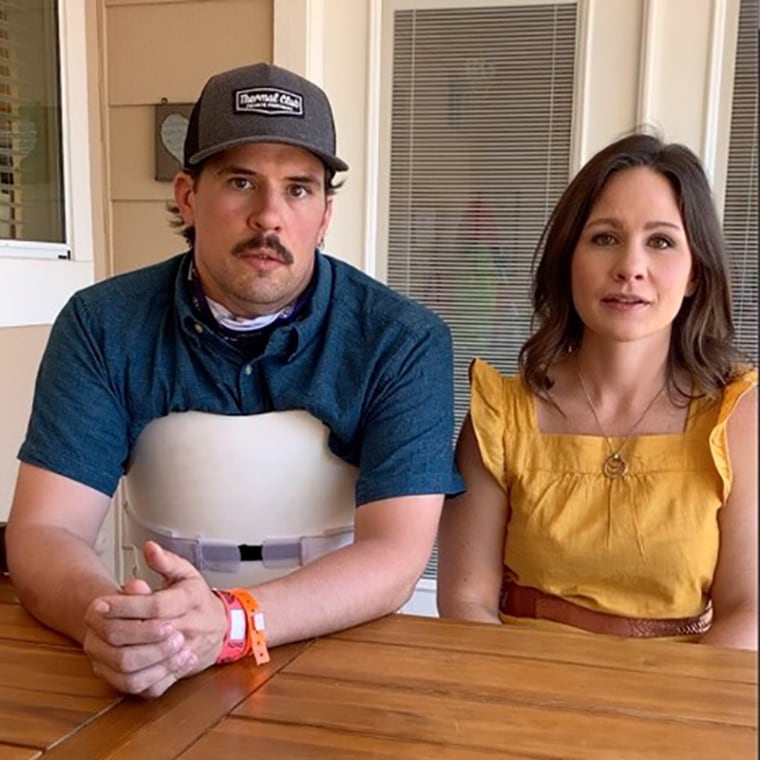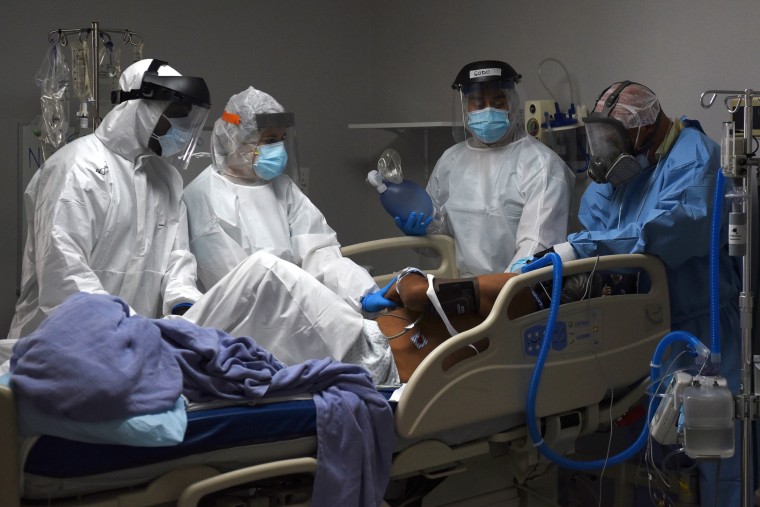Casey Rogalski describes himself as a 38-year-old father of two with a full head of hair. But he was also diagnosed with stage four colon cancer in June of last year. Since then, he has had to undergo surgery and 12 rounds of chemotherapy, along with a liver operation in March and a spinal operation in May, all while living in Arizona, where coronavirus cases and hospitalizations are surging.
Now, every daily decision — whether he and his wife go to the grocery store or take their 9-year-old son or 7-year-old daughter out on a walk — takes on new meaning. Is it worth the risk?
"It is 100 percent life or death, whether you contract the disease and you get it or it affects how you receive one of your treatments or procedures. It is life and death," Rogalski said in an interview.
Full coverage of the coronavirus outbreak
Coronavirus cases and hospitalizations have been setting records in recent weeks in states like Arizona, Texas and Florida.
The data have shown that the spikes have been driven in large part by young people, while older people and those with compromised immune systems remain highly vulnerable.

"My message is be respectful of everyone around you. You might not think it's going to affect you, but the person next to you, they could have something going on," Rogalski said. "I hate to say it, but I'm a great example. If we met face to face, you would have no idea that I'm going through any of this."
Elaine Ryan, vice president of state advocacy for AARP, said the underpinning emotion has been fear in tele-town halls and focus groups the organization is conducting with members.
She said people were asking: "How do I manage my health during this time? Is it safe to go to the doctor?"
Ryan implored younger people in states where cases are spiking to take the pandemic seriously.
"We are inextricably tied together, and it's never more true than during this pandemic. You can see the pandemic has no borders. It doesn't discriminate based on age. It doesn't even let you know that you're infected, and so at this time, at the height of pandemic, we really have to feel that common sense of responsibility to each other," she said.
Diane Pope, a retired public health nurse in San Antonio, Texas, talked about the pain of no longer being able to visit her 95-year-old father Gerald who lives in a home for Alzheimer's patients. Before the pandemic, she was able to take him out on long drives to keep his mind stimulated.
Now their interactions are limited to phone calls because of coronavirus safety concerns. Pope now has to explain to her father every time she calls him why she can no longer come to see him.
"Every time I talk to him, it’s a whole new thing, 'Why can’t you come see me?'" Pope said. "We have to go through the process every single time and that just breaks my heart."
While she is very happy with the care he is receiving at Brookdale Nacogdoches and says they have not had a case of a resident or staff member getting ill with coronavirus, she worries about the lack of human connection with her.
"When I look at people going out into the public now, what I see is the prolonged time that I'm not going to get to be with my dad while he is losing his memory," she said.
Pope, 74, said that with her own age, "I had to make a commitment to follow the public health initiatives that we have here and that is for older people to stay home."
She said, even before the recent spike in Texas, she only went out for doctor's visits and an occasional drive.
As for those who are going out without precautions and potentially contributing to the spike in cases, "I would love to be able to say, think of your grandmother, think of your mother and father."
"We have beautiful weather, people want to get outside, I understand, I do too, but I am willing to give that up to follow the health regulations that are being suggested strongly," she said.
AARP has been calling for transparency in reporting of data on cases in nursing homes and assisted-living facilities, access to personal protective equipment, staffing standards, mortgage foreclosure protections and eviction protections, Ryan said.
Nursing home residents account for nearly 1 in 10 of all the coronavirus cases in the United States and more than a quarter of the deaths, according to an Associated Press analysis of government data released last month. About 1.4 million older and medically frail people live in such facilities, according to the AP.
Dr. Anthony Fauci, director of the National Institute of Allergy and Infectious Diseases, said last week during a news conference that "people are infecting other people, and ultimately you will infect someone who's vulnerable."
"You have an individual responsibility to yourself, but you have a societal responsibility, because if we want to end this outbreak, really end it ... we've got to realize that we are part of the process," he said.
Speaking before Congress on Tuesday, Fauci said the number of daily new infections could more than double unless the nation can control the spread of the coronavirus.
"We are now having [40,000+] new cases a day. I would not be surprised if we go up to 100,000 a day if this does not turn around," Fauci said. "Clearly we are not in total control."
Meanwhile, states across the country have paused reopenings, with several closing businesses they had previously opened. Arizona, California, Florida, Texas and Michigan have either fully or partially shut down bars, theaters and gyms in parts of their states following the recent swell of cases.
Jenny Martin, founder of the Phoenix Cancer Support Network, said clients have needed more help to get to their treatments after the America Cancer Society stopped providing transportation through volunteers during the pandemic. Such costs had been about $2,000 a month. Now they are up to $5,000.
Martin said she founded the nonprofit after her sister Annie died of cancer at age 24. Rogalski is a client.
The group has also provided services like assistance with groceries and meals and help with copayments and cleaning services.
"I'm scared they won't leave their house and get their scan and their cancer will progress and they'll die," she said. "There's just this terrible choice for them to make."
Download the NBC News app for full coverage and alerts about the coronavirus outbreak
Rogalski was hoping to start a new antibody treatment, which would be less invasive than the previous radiation treatment he had been getting. But all of that would depend on his staying healthy.
Given the rise in new cases, he urged everyone to practice personal responsibility and to be mindful of the people around them who might have health challenges that aren't apparent.
"It's just kind of crazy, this whole thing. You don't realize how one little virus can affect your whole, entire world and everything around you," he said.
"Any little hiccup in the plan can cause major issues," he said, adding that his goal is to continue his treatment and get better for his family.
"I want to be here," he said.

